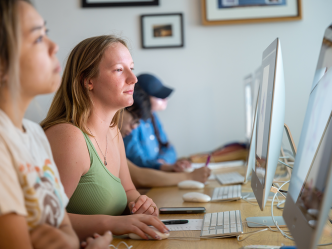The sudden closing of school systems in the area has inspired innovation in distance learning techniques across the state of Georgia. From St. Mary to Ringgold, parents have been thrust into a quick-change scenario, suddenly providing lessons and guidance for students from kindergarten through high school. So, how does a parent without a background in education take on the challenge of educating their children?
It starts by freeing yourself of expectations, and it ends with finding your family’s new normal, say experts from Augusta University’s College of Education.
“Everyone definitely needs to give themselves some grace — for yourself and for your kids. Even with all of my years of teaching, this has been a transition,” said Dr. Stacie Pettit, associate professor of education at Augusta University and parent to five children.
Pettit said parents who found themselves with children suddenly out of school for the rest of the year should not measure themselves against homeschooling parents they may know.
“Homeschooling families took months to decide, they had time to set up, they gathered resources, they have cooperatives. This is new for most of us,” Pettit said.
Set the expectations
Dr. Nicole Peritore, assistant professor of kinesiology at Augusta University, found herself suddenly homeschooling her second- and fourth-graders and said the first thing she and her family did was discuss how they would move forward.
“We held a family meeting and discussed what the expectations were. We discussed that mom and dad still have to work, so they know there will be times that we can’t be at their beck and call,” Peritore said.
It’s important to remember that parents aren’t the only ones flying blind in this new environment, said Dr. Laura Rychly, assistant professor of education at Augusta University and parent of two children. Parents should acknowledge to children that the challenges they face are real.
“Sometimes I think we’re not as honest with kids as they need us to be. Transitioning from going to school every day to not going to school at all is an enormous adjustment. An insistence on business-as-usual creates a sense of denial and doesn’t give us a chance to acknowledge that this is different and weird, and it can be anxiety-producing,” Rychly said.
But these challenges are surmountable with time and the ability to adjust your tactics according to what works for your family.
Find your schedule
Ariel Lucas is a parent of three children and holds a master’s degree in special education from Augusta University (M.Ed., 2015). She’s also an experienced homeschooler who said parents need to start by finding the schedule and subject rotation that works for them.
“I wanted to fit all the subjects in every single day. Unless you want to torture yourself and your children, it’s impossible,” Lucas said. “I also was trying to work for eight hours, but the state of Georgia regulations say you only need four hours of instruction time.”
Delia Collins is a homeschooling parent of three and the homeschool coordinator for the Jessye Norman School of the Arts, a frequent collaborator with the College of Education. She said parents shouldn’t think of school as something that happens at a desk.
“Look outside the box for opportunities to learn things. A lot of math happens while baking in the kitchen. You can read anywhere. You can find bugs and work on science. It doesn’t have to be books and worksheets. Hands-on stuff is amazing,” she said.
If the kids can’t sit still anymore but it’s raining outside, try alternative learning opportunities like documentaries, virtual field trips, arts and crafts, and physical education. And allow independent subject study in an area that interests your child.
“If they want to go down a rabbit hole about giraffes, that’s fine, as long as it’s educational,” Collins said.
Work toward a new normal
But getting to that point will take time. Pettit said she’s still finding her family’s new normal.
“I get down on myself like, ‘Why are we not doing virtual field trips?’ But this is week two. That stuff will come. Figure out the must-dos and then integrate those fun things as you go along and get your routine down. I’ll be honest: I haven’t had any celebrity read aloud to my kids yet,” she said.
And Rychly said you might need to help kids figure out their own workload priorities.
“All teachers are not communicating in the same way. If you have multiple kids, it’s important for you to touch base with their teachers. Some are giving work daily, and some are giving a bolus of work due after a while and they can both be overwhelming in different ways,” Rychly said. She recommends getting a paper calendar and writing assignment due dates on it. Also, be mindful of the potential consequences of this increased screen time. “As parents, I think we should feel comfortable saying, ‘Let’s take a break and go for a walk.’” She noted that time management due to different kinds of work for different ages of children can be a challenge, but is important to deal with proactively.
When helping teens deal with the transition, it’s time to give them the gift of personal accountability.
“With older kids, give them some independence. Teachers don’t stand over their shoulders. They give them assignments and then back off. So, during this time, also let them fail. If they don’t get it wrong, if we help them do it perfectly every time, they’re not really learning,” Lucas said.
And if you can’t assist them with an assignment — say you majored in English and they’re finishing calculus coursework — remember that teachers and schools are still available for individual help and tutoring. Reach out for the help your child needs.
Explore outside the norms
Collins said parents should consider additional learning opportunities outside the traditional curriculum.
“This is an awesome opportunity to teach them things they don’t learn at school,” she said. “How to change your oil. How to properly maintain the dryer. How to manage a bank account. How to cook simple meals safely. How to sew a button. Kids are always ready to learn.”
It’s also an opportunity to start on professional skills. Rychly said she looked around and realized her whole family was working together at the dining table — and not always well.
“My child wanted to read everything out loud to me – emails, PowerPoints, essays – and we’re all working in the same space. That led to a conversation about how to work with other people,” Rychly said. “This is a good time for kids to figure out their work style – do they prefer to be collaborative or more independent? Can they work in silence or do they need background noise to help them focus? How do you share space with colleagues – other students or parents or future coworkers – and stay on track without getting in each other’s way?”
And Peritore said even during social distancing, finding ways to socialize is still very important.
“Use Skype or Facetime to connect with family. Utilize things like Google Meet to provide social opportunities, and of course they can use good, old-fashioned telephone technology. You can also utilize this as an opportunity to teach letter-writing skills and how to use the postal service,” Peritore said.
Finally: This, too, shall end.
“Try to remember that this is temporary,” Peritore said. “It might last longer than we expect, but it is temporary.”
 Augusta University
Augusta University





